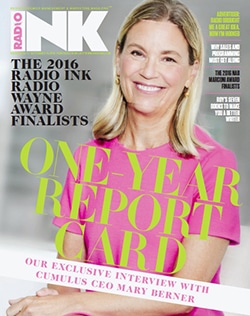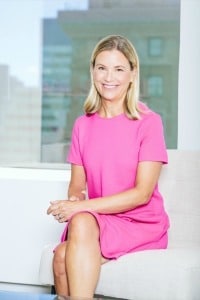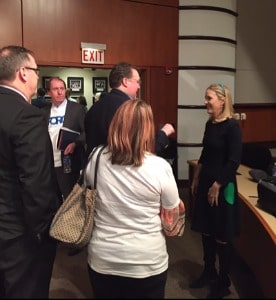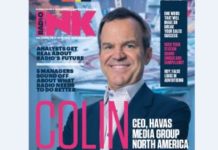
It’s been one year since Lew Dickey was pushed out as CEO of Cumulus, a company he founded in 1997. That also means it’s been one year since Mary Berner took over. What’s changed?
First, a quick look back at how all this came about.
In mid-2015, when a seat on the Cumulus board opened up, the Cumulus nominating committee, chaired by Crestview Partner Jeff Marcus, appointed Mary Berner to the seat. Marcus began visiting Cumulus markets all around the country, without Lew Dickey, to get unfiltered feedback from managers running Cumulus’ radio stations. As ratings continued to decline, market share continued to deteriorate, and broadcast cash flow continued to drop, Marcus and the board decided that, under Dickey, the company’s direction was not changing for the better.
What Marcus says he found when he traveled around the country was great radio brands run by good people who were not being allowed to do their jobs. In a November 2015 Radio Ink cover interview, Marcus said, “There was a command-and-control system in Atlanta that was designed to rein people in and to make their lanes so narrow they didn’t have an opportunity to operate.” He also found a destructive company culture. A change needed to be made at the top.
Mary Berner had been tasked with leading the Cumulus board’s Operations Review Committee. That group was asked to take a detailed look at the Cumulus operation and figure out what needed to be done to fix it, because, as Berner says, clearly something was broken. What that committee found was a failed ratings strategy, an unhealthy culture, and unhappy employees unable to execute. Change was on the way.
As the 2015 Radio Show was set to kick off in Cumulus’ corporate home of Atlanta, it was announced that Mary Berner would be replacing Lew Dickey as CEO. She’d already gained a feel for the issues as part of the Operations Review Committee, and she had experience running other media companies. Critics immediately began asking how this could work, given that Berner had no radio experience. But Marcus, who’d had quite a successful run with Tom Hicks at Chancellor Media in the ’90s, was very confident in Berner’s ability to turn the company around.
Berner does have a long resume of running big media companies: She’s served as president and CEO of the Association of Magazine Media, from 2007-2011 was CEO of Reader’s Digest Association, and before that was CEO of Fairchild Publications. She would tell you working in the radio business is like being in the “same church but a different pew.”
Berner quickly set out to change the culture, holding town hall meetings across the company and promising to respond to all e-mails within 48 hours. She’s attempting to change the operational structure by allowing more local decisionmaking, and has had an Office of Programming created. The NASH magazine was shuttered. SweetJack went away.
Her battle cry is focus, responsibility, collaboration, and empowerment. And she’s trying to create an atmosphere where good employees want to stay with the company, and to create a culture where talented people want to come to work for Cumulus. And, as you’ll see in our interview, she says it’s working.
Berner also let investors know this will be an extremely difficult turnaround and will take time, calling Cumulus’ challenges “significant but fixable.” In March Berner said, “Given time, Cumulus has the assets to be one of the winners in the radio industry.” And, of course, there’s the debt. Cumulus is saddled with over $2 billion in debt and is constantly looking at ways to address that to provide the company with long-term stability.
The big question: Does Mary Berner have enough time to turn this big ship of over 450 radio stations around?
 Radio Ink: How and why did you first get involved with Cumulus and the radio business?
Radio Ink: How and why did you first get involved with Cumulus and the radio business?
Berner: I was recruited by the Cumulus board and Spencer Stuart to be a board member when Lew Dickey was still CEO. During the recruitment process, they told me that what attracted them to me was my experience and success in running advertising and content businesses across a wide range of platforms, as well as my experience evolving traditional media companies. And what attracted me to the opportunity was that — given my particular experience — I had had a lot of success addressing the same kinds of challenges facing Cumulus, so I thought I could be helpful as a board member.
Then when I was a board member, I led the board’s Operations Review Committee. The committee was charged with doing a deep dive into what was going on operationally. We did the work with an eye toward figuring out how we could support the company in fixing what was broken, because clearly something was broken. It was through that that I got a really defined view of the company and its problems.
It was clear that the company needed to block and tackle at a higher level across pretty much every function. And it was clear that the ratings strategy needed a systemic overhaul. And it was loud and clear it had a toxic culture with dispirited employees that needed to be addressed. The committee also concluded that while the company had a lot of good ideas, it was largely unable to prioritize and execute them. I think through that work the board got a perspective on how I would approach Cumulus’ management.
And as for coming to run the company, as Cumulus’ board chair, Jeff Marcus, said in his interview with you, I believe the board felt that, after years of focusing on acquisitions, the company needed an experienced operator who could make all the pieces work together well. I also think there was a clear recognition by the board that it is one thing to buy a bunch of assets, but it requires an entirely different skill set to mesh those assets into what would be a cohesive and synergistic whole.
Additionally, recognizing the fact that the company was on a multi-year downward trajectory and that there were obvious and significant challenges, they wanted the next CEO to have experience in turnarounds, because they are entirely different animals than running a normal and healthy company.
Radio Ink: The experience you had gave Jeff and the board the confidence to transition you from a committee to the CEO position. What was it in your background you can tell us about that put you at the top of their list?
Berner: As I said, I think with the work I did leading the Operations Review Committee, they could see firsthand how I would approach things. They also knew — through the rigorous vetting process they put me through when they recruited me for the board — that the companies that I’ve run were complicated content and advertising businesses that operated across a wide range of platforms and formats.
Each of the previous companies I ran were, like Cumulus, traditional media businesses that needed to be evolved in some way, shape, or form. For example, most people think Reader’s Digest Association was just the magazine. The magazine was 15 percent of the business. The company operated across 79 countries, it had 28 brands, including large digital brands, and large direct-response television brands. It was a complicated and troubled business — and my team and I developed and executed a successful turnaround strategy during one of the most challenging periods in RDA’s history — which later led to the doubling of the company’s stock price.
Radio Ink: What was the transition like at Cumulus? You had a CEO who had  been around for a long time and founded the company.
been around for a long time and founded the company.
Berner: It was clear to the board, as I said, that the company was in trouble. There were significant operational challenges and a track record of years of financial decline. Obviously, turning the company around would require a different approach, and we needed to focus on operating the business and making everything work together in a way that, as I said, is cohesive and synergistic.
So as for the transition, I had a pretty good sense walking in the door of the big issues we were facing. On the flip side, I also had a pretty good sense of the company’s enormous potential. I knew coming in that it would be tough, that it would be a long haul to turn it around, but some things were better than I expected — and some things were worse.
I knew that the key to our turnaround success would lie in our ability to focus on the few things that would drive the business and get all of the distractions out of the way, to focus on what would move the needle the fastest and get the highest impact in the shortest amount of time, and to prioritize so that we could execute better. That’s how I walked in and thought about what we were going to do.
Radio Ink: What about the question of not having any radio experience?
Berner: People were wondering about that a year ago. For me, being in radio is like being in the same church but a different pew. There is sort of a commonality of what drives success in media.
The principles are commonalities. It doesn’t really matter what the platform or format is. It is focused around content differentiation and advertiser differentiation and ability to operate and the ability to have a culture and have employees that go the distance. And that all kind of helped me. Those principles helped me.
In some respects, what I was thinking about, there is a decided advantage. Looking back, I have not been burdened by preconceived notions about how things have always been done, and by definition, as someone who isn’t an insider, my set of eyes has never been influenced by reputations or politics or sacred cows. It’s allowed me to see the forest for the trees, which for sure directly helped us to shape our key turnaround strategies.
It also made me listen harder to the markets. I’ve gone to over 60 markets. And I will hit all 90 markets before my year anniversary. So I’ve personally spoken to two-thirds of our employees, and I only ask one question: What do I need to know?
What I get is, the answers are repetitive. You hit on the themes that support that the strategies are correct, and those things became the basis for what we needed to change. And also, because I am not from radio, we manage the business based on what our data and insights tell us about the trends.
And this is a really important point: I don’t go with gut feel, because it would be absurd for me to do that. I don’t have enough gut to go with that. As I look back over the last year, I think, OK, where are we performing well? We isolate what’s driving that, and we put more fuel in that fire. When we’re trending down, we diagnose and course-correct. So that management approach is industry-agnostic, but it is also proven to be effective, because I don’t have any point of view on “What’s always been done.”
I don’t necessarily care what the sacred cows are, or what people’s reputations are, or all of the politics. I wouldn’t be aware of it. It’s been a huge advantage. And then listening harder, because I wanted to quickly deepen my understanding. All those data points, you validate, from every single perspective. So it gives me confidence that we are firmly on the right path.
Radio Ink: What was the most important first step you took?
Berner: To establish the clear point of departure for the company, because that is the first step to launching a turnaround — accurately diagnosing the problem. Because you can’t get to where you’re going if you don’t know where you are. And so job one was to cut through all of the noise and clearly establish “Here’s where we are.” Only after establishing that point of departure was it possible to nail down our point of arrival, the “Here’s where we need to go,” so that we could quickly develop strategies around “Here’s how we’re going to get there.”
And, as important as establishing our point of departure was, standing up in front of the whole company on my first day — a couple of hours into the job — to acknowledge the facts about what was going wrong and to put it out there that we’re in a turnaround. I knew our point of departure was bull’s-eye correct because I had so much information and data supporting the diagnoses — including deep and broad employee feedback.
A couple of days before I arrived, I sent a survey out to the whole company, and I asked five simple questions: What do you hope I do? What are you afraid I will do? What are the top three things that you think we need to fix? What are the top three challenges? The top three opportunities? Half the company responded in three days, and I read every single survey and all of the comments. They validated what the data showed, what I had seen and learned through the Operating Review Committee and the feedback I had gotten from the board, and what I learned from my initial conversations with the leadership team.
Radio Ink: What do you mean when you say “data-driven”?
Berner: We track everything. People in the markets are empowered to make decisions. For example, with the Office of Programming, which is the centralized resource for our programmers, they can use them, but they can also make their own decisions. But we’re tracking those decisions. We are tracking what works and what doesn’t. With that authority comes that accountability. It’s real accountability for performance, so not everybody is going to make the cut.
And that is OK, because our job is to build value for our shareholders. I believe the best way to do it is to put the power back in the markets. Again, not everybody is going to be up to it. But it’s clear what the goal line is. It gets back to the rigor around how we are tracking what goes on. And data. What I said before about the gut feel? There is no gut feel. Facts are facts.
Radio Ink: So it’s been a year. Give us an update on how things are going.
Berner: A year in, our progress from addressing our key issues head on is encouraging. Take ratings. The ratings focus is pretty straightforward — the better we serve our listeners, the stronger our advertiser value proposition, our brands, our company, and ultimately, our financial performance.
When I joined last October, we had seen four straight years of ratings declines. What we had been doing was playing whack-a-mole — trying to fix one problem at a time, only to have a bunch more pop up. When you have 454 stations, there is always going to be something going wrong, but our issues weren’t one-offs.
The relentless downward trajectory made it clear that the problems were systemic. And to fix a systemic problem, you need a systemic solution. So we did that by creating the Office of Programming as a centralized resource and putting the authority back in the local stations where it belonged. The results speak for themselves, and are a real testament to the depth of talent in the local markets and the strength of the Office of Programming as a central resource.
Through June, our PPM markets in aggregate have now shown eight straight months of year-over-year growth and outperformance vs. the industry. And out of 17 markets, in the month of June, 15 markets showed year-over-year ratings increases in the prime money demo and two markets were flat. Zero declined. For the 70 diary markets — in the spring book — for the first time in five years, our stations have maintained their audience, as opposed to showing declines. I would say on that, so far, so good.
Our culture was another big challenge. The command-and-control corporate culture created a culture of fear, paralysis, silos, and our employees were both dispirited and, frankly — pissed. It’s hard to overstate how important it is, because it’s the basis from which you can build everything else. Without your engaged employees, it doesn’t stand a chance to turn around. And we were at the very other end of the spectrum. You can call around and I think what you’ll hear is that the change in the culture has been nothing short of seismic.
And it’s not just squishy stuff. It is a rigorous and systematic implementation of a cultural values framework. That’s the first thing. The second is a really clear framework for how we make decisions, how we behave, how we win. The second part of it is demonstrating — and this is as important — that we walk the talk in terms of valuing our employees. You can’t fake that. It’s not about putting a bunch of slogans on a conference room wall.
It’s about walking the talk. That also doesn’t mean giving everybody everything they want. We are in a turnaround. We don’t have the resources. But it’s about being completely transparent about what the challenges are, about how we’re doing, what we’re doing, why we’re doing it, and what’s expected of people. We’ve done some things that have been positive for our employees, and we’ve said no a lot as well. It’s about demonstrating respect and transparency and appreciation for their efforts.
I think we’re seeing the benefits seeping into the marketplace. Resumes, for example. When I got here, no one wanted to work here. Now resumes are flying in, which as my HR guy pointed out to me, is a pretty new phenomenon here. It’s positive for recruitment, but it also is positive for employees. What are we seeing? Plummeting turnover.
As was well publicized, our turnover was very, very high. It’s very expensive. The opportunity cost and the impact on the business is enormous. And we have made huge progress in fixing that. As we reported in our earnings call, for example, for salespeople, our voluntary turnover was down to 24 percent year-to-date, versus 40 percent in the same period last year.

Radio Ink: It’s not easy to change a culture.
Berner: You have to be authentic. The point is, which I want to emphasize, I say no a lot. I say no more than I say yes. Lest anyone think it’s just because we’re giving an extra vacation week or something, it is so not that. Our biggest issue for our employees right now is our health insurance. Our employees would like it to be stronger. We can’t afford it. So I said no. On big things, we have to say no. But I think what’s important is it’s honest and it’s transparent, and people understand why.
I don’t try to spin our employees. You do that and you lose people, because people aren’t stupid. They understand. I’ve been really clear that what we’re doing is difficult. What we’re doing is high-risk. What we’re doing is going to take time. It will require sacrifices. We will have some setbacks. For every two steps we move forward, we may have a half a step back. But we have a plan. We know where we started. We know where we’re going. So it’s up to us to execute it. And we will be completely transparent and rigorous about communicating where we are. Most people can get behind things if they understand why, where, when, and how and who is doing it. So we’ve been very, very focused on that.
Radio Ink: So, specifically, how are you turning that culture around?
Berner: To me, having an engaged and motivated employee base is foundational. It’s absolutely foundational to achieving higher performance and then continuing to improve results. We didn’t talk about the tactics, but there is a lot of talk about what culture is, how that affects performance, and it is well documented that there is a direct correlation between strong culture and financial performance.
There is not a CEO on planet earth who doesn’t want a great culture. So why do so few have it? Right? It’s because it’s a strategy like any other strategy that needs a plan. It needs to be executed well. It needs to be reinforced. Again, it’s not some squishy thing. There are well thought-out tactics around it. For example, we’re going to be focused. You can’t be focused if no one is responding to each other, because you’re wasting a lot of time, right? Our 48-hour response-rate rule addressed that.
It started with me committing to responding to everybody in 48 hours. My management team followed suit, and then everybody in the company made the 48-hour commitment. It has singularly probably been one of the biggest changes for this culture that we have instituted, because you think about what that did: We freed up people. Decisions were made faster. We stopped wasting a lot of time. That’s just one of many examples of how we operationalized our culture strategy.
Another example is to solicit and really listen to and respond to feedback — personally respond immediately to the extent possible, but never leave someone hanging for more than 48 hours. Asking for feedback and really listening to it and responding to people is not only respectful of your employees, it’s really good business, because every single strategy came from — again, I will just go back: My first survey. It was just clear.
I knew it already from the Operations Review Committee: ratings, big issue. No one is talking about them. Ratings — we need to focus on that. Our culture is a mess. Our blocking and tackling. We don’t do basic things pretty well. The strategies come from our people, and our people make them better. The ideas we get — I hear a theme enough, I know that that’s an issue. That’s where the benefits of really engaging your employees are.
Radio Ink: Why is it working?
Berner: It is working because we have started to make Cumulus the kind of place where people want to work. Like I just said, that starts with being very clear about the kind of company we aspire to be, and I think our employees believe us. The reason they believe us is because we are walking the talk.
Why is it? Because, I would say, we are clear about what we expect from our employees. We have a framework around which to make decisions. We communicate really rigorously. And we’re honest. I don’t stand up and say that everything is great. I say how hard it is. This turnaround is hard. It’s risky. It takes a lot of work. There are more nos than yeses to our employees.
But what I think they appreciate is that there’s a path and the path is clearly articulated and they understand their role and they understand how important their role is. At the end of the day, most people want to go to work and feel like what they do matters. And it does matter. I think they want to be part of that. We did our follow-up survey about a month ago, and again, we had over 60 percent of our employees respond. I’ve never seen response rates like this. Ninety-four percent think the company is changing for the better, and 92 percent are now proud to work at Cumulus. That is a complete flip, and this isn’t some small sample.
Despite the fact that we are in a turnaround and that turnarounds are, by their very nature, really hard work, our employee engagement is extraordinarily high. And the data to back it up really bodes well for the company, because it shows that what we’re doing is working, and I think the underpinning for this is this concept of HABU, which is “Highest And Best Use.”
What that is, is a principle around decisionmaking that every employee understands, which is that we are in a turnaround. So everything we do, we have to focus on “Is this the highest and best use of my time, my resources, my focus?” And it’s a really simple concept. But if you actually apply it every day to what you’re doing, you would make better decisions, you would make more of them — so you’re not paralyzed, and you make them faster than before.
RI: You mentioned the ratings. Cumulus has iconic assets in New York, San Francisco, Chicago, and other big cities. Over the years, they’ve kind of lost their shine. Can you bring them back to where they once were?
Berner: I’ve said this before: It starts with your listeners. Your three most important stakeholders are your listeners, your employees, and your shareholders. You get it right with your listeners, so it speaks to the iconic brands and getting it right — and I think we’re doing a lot of things right — the rest of it is considerably easier, because then the advertisers have a better value proposition, your employees have a better company. You’re able to attract and keep the right people if you’re a company that’s got better product. That’s kind of where we are.
Can we do it? Sure. We’ve got great brands and after years of underinvestment in those brands, we are investing in our product. The question is, “What is HABU? Where is the highest and best use of the limited resources that we have?” And we wrestle with that every day.
RI: How are you feeling about how things are going at Westwood One?
Berner: I’ve talked about the challenges on Westwood One. It is a strategic asset for us, and it gives us a point of differentiation for national advertisers that allows us to play in a different ad channel, allows us access to marquee brands, and is a differentiator for key talent across the country. It also provides financial benefits for economy of scale for both our owned and operated platform as well as our third-party affiliates.
However, it is a complex business that was plagued by years of underinvestment, challenged acquisitions and integrations, and lost talent. We’ve worked hard to rebuild it. There have certainly been signs of success, but there’s just a lot more work to do to stabilize the business and turn it into a growth driver. I am 100 percent confident our new leadership is up to the task.
RI: How’s it going refinancing the debt? How do you feel about that?
Berner: We previously released an 8-K announcing that we are in discussion with certain debt holders regarding the potential discounted exchange of our senior notes, so we are continuing to have conversations to explore the strategies that can actually do that and provide the stability. But that’s all I’m going to say about it.
RI: You said the turnaround is going to take time. How much time, do you think, and do you feel like there is enough time?
Berner: This turnaround will take years. You asked the question, what does Cumulus look like in two to three years? I would say certainly the company will look better than it does today from an operating perspective — it already does. I would like it to be past the turnaround stage. I would like it to be financially stable and beginning to grow in both revenue and EBIDA. It needs to have a balance sheet that supports, rather than suppresses, the company.
I hope that we will be a talent magnet. And I would like to think in that not-too-distant future we will have developed an effective digital strategy — by that I mean figuring out what we have to do to make radio viable in this new digital universe, not just for the next decade but the years beyond. And I would expect that our employees see in Cumulus a place to grow, both financially and professionally. So bottom line: It will take time. It is as simple as that.
Radio Ink: What do you think of the radio industry?
Berner: What I want to say — but then I’ll get quoted, but I might as well put it out there: I think it’s the worst-promoted industry I’ve ever seen, for its incredible intrinsic value proposition — to listeners, advertisers, and investors. I was so surprised to learn how much value there is and how strong radio is vis-a-vis other traditional media, or other media in general, in terms of its reach, its ROI, its persistence, its ability to connect and engage people on a local level. These attributes are ones that other media that I’ve been in would kill to have.
And here radio is, sitting on this incredible story when it should be shouting it from the rooftops. After speaking with the guys who run the other radio companies, they didn’t need me to tell them that as an industry, we have to do a much better job promoting the value of radio and its unique value proposition to our listeners and to our advertisers, because it is unique and it’s very difficult to replicate.
Radio Ink: That’s not going to be a shocking statement. For years, radio executives have been saying radio needs to tell our story better, but for some reason, nobody has been able to figure out how.
Berner: It certainly isn’t because of a lack of interest or sense of urgency from those of us who run the companies, and we have been talking about how to break through all of the clutter and misperceptions about radio to get the real story out there. I think what happens is, of course, everybody gets tied up in their day jobs.
But the good news is, the story is there to tell. You don’t even have to spin it. It’s just fact. The differentiation, the value proposition of radio versus other media is not only distinct, it’s enviable. It really is. We have to tell that story better. Like I said, we are talking about how to do that.
What I always look at is, what is the USP — the unique selling proposition. The consumer, the ultimate consumer, for magazines, it was the reader. For radio, it’s the listeners. What’s the value proposition for investors? What’s the value proposition for advertisers? On all three of those, radio has a strong value proposition. And that’s not the perception. And that’s really a darn shame that it isn’t more widely understood and more effectively promoted, if you ask me.
RI: Do you feel like the radio industry is cheering for you?
Berner: Oh, yes. I think everybody in radio wants radio to do well. This is one where the rising tide lifts all boats. My competitors and colleagues have been nothing but helpful to me. Another thing that’s really struck me about this business is that people who are in the business, they love radio. This isn’t just a clock-punching job. People in radio are passionate about radio. That, to me, is another reason why people really, really want Cumulus to be successful in our turnaround, and also one of the reasons our employees are getting behind our strategies. Everybody is getting behind it because they love what we do and they want to see it do well. And that’s encouraging.
RI: What do you want all the Cumulus employees that read this interview to know? What do you want to say to them or somebody that might be thinking of working for Cumulus?
Berner: That’s a really good question. I want our employees to know — and I think they do know this –— that they are our company’s most important asset. Period. And that we have a clear path to success and we are sticking to the path. And that turnarounds are hard slogs, a one-foot-in-front-of-the-other, step-by-step process, but we are singularly focused on doing that and that it is working.
You know what I’d especially want them to know? I would want them to know how appreciative I am of how engaged they are, because by any measure, I’ve never seen anything like the Cumulus employees’ engagement in doing what it will take to turn the company around. So I would want to say thank you for doing what it takes, for the support of the agenda, for embracing what we’re doing, for being willing to put up with the kind of sacrifices that they have to put up with, for all of their hard work, and especially for all of their feedback: ideas, suggestions, criticisms, questions that they send me every single day. Knowing that they’re engaged and side-by-side with me and the leadership team moving forward to turn the company around is what fuels me, and I am so, so appreciative of that.








